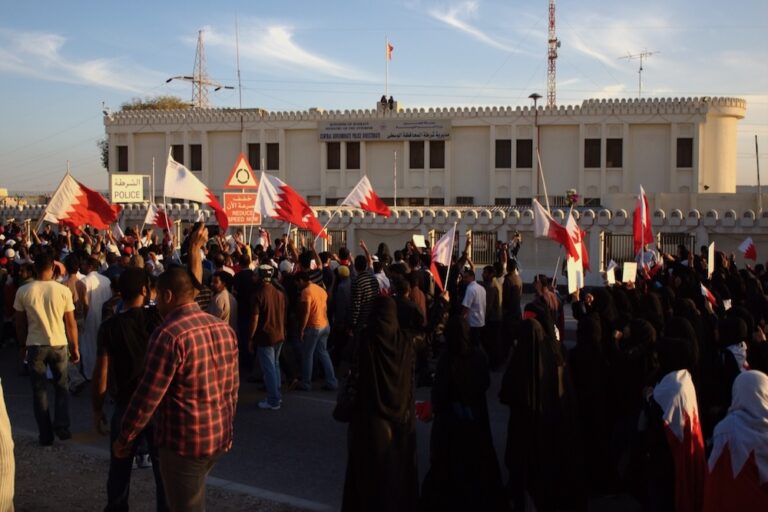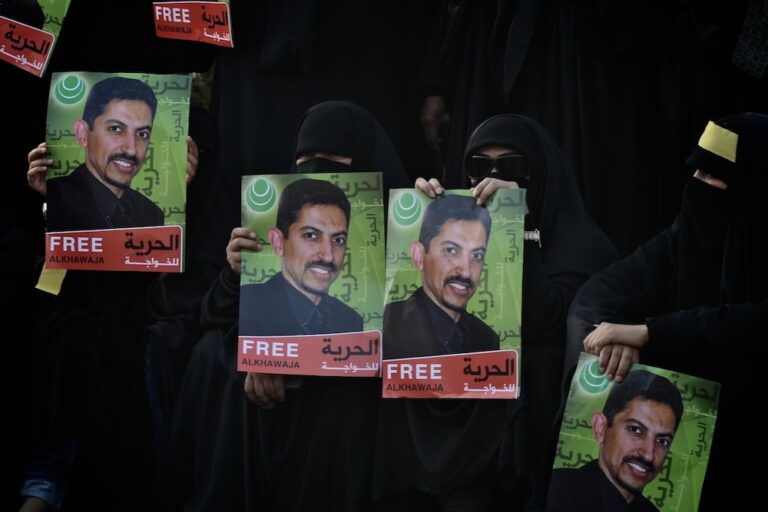Despite the regime's brutality, the United States recently signed a multimillion-dollar arms deal (currently on hold) with the country and has remained largely silent amid a crackdown that proportionally surpasses the magnitude of any other in the region.
(Freedom House/IFEX) – Amid the political convulsions wracking the Middle East, few prolonged protests have been as ignored by the West, particularly the United States, as those in the tiny Gulf monarchy of Bahrain. Despite the regime’s brutality, which has targeted peaceful protesters, human rights activists and medical personnel, the United States recently signed a multimillion-dollar arms deal (currently on hold) with the country and has remained largely silent amid a crackdown that proportionally surpasses the magnitude of any other in the region. Despite the fact that Bahrain is home to the US Fifth Fleet and has received the coveted designation of ‘non-NATO ally’, the people of Bahrain have the same right to advocate for democratic change as their counterparts in the region.
On February 14, 2011, just days after Egyptian President Hosni Mubarak stepped down, Bahraini youth held a peaceful demonstration in Manama’s Pearl Square calling for a new constitution that would support economic, political and social accountability. Protesters demanded justice for the victims and perpetrators of arbitrary arrests and torture in Bahrain. Organizers chose this date because it was the tenth anniversary of the National Action Charter of Bahrain, a referendum supported by 98% of voters that called for the end of a particularly violent period of Bahraini history (1975-1999) and for constitutional rule in the country. They optimistically viewed the changing political dynamics in the region as an opportunity to advance democratic reform in their own country.
Saudi Arabia’s intervention is particularly disturbing given that Sunni-dominated country’s support for the Sunni-minority Bahraini government’s hardline tactics. It raises concerns that Saudi Arabia is exacerbating sectarian cleavages in a broader attempt to reduce Iranian Shiite influence.
Rather than responding to the legitimate requests of its citizens, however, the Bahraini state violently attacked demonstrators and those who sought to defend them, eventually calling in foreign reinforcements, including troops from Saudi Arabia and Qatar, UAE police, and mercenaries from Pakistan. As a result, demonstrators’ demands escalated from those concerned principally with political reform to those calling for the end of monarchic rule and the removal of the prime minister, who has held power for the past four decades. The September 24 parliamentary elections, which filled 18 seats vacated by opposition deputies who resigned last spring over the violent crackdown, were boycotted by several Shiite groups.
In a country where the majority of the population is Shiite but the rulers are all Sunni, the conflict between the government and demonstrators has taken on sectarian overtones. While many Shiite and Sunni activists work side-by-side for the rights of all Bahrainis, the Bahraini government has stoked sectarian tensions through anti-Shiite campaigns that link human rights with treason, incited violence against Shiites, and carried out large scale dismissals of Shiites from teaching and other professional positions. There is also anecdotal evidence of systematic naturalization of Sunni expatriate workers and among the security forces in an attempt to alter the sectarian balance in the country. This evidence follows substantiated reports of demographic manipulation that initially emerged in 2006 with the leak of a document, allegedly from the government, outlining a plan to alter the county’s demographics through naturalization.
(. . .)


